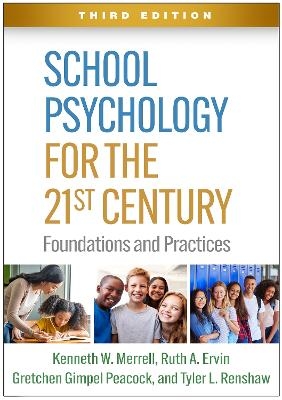
School Psychology for the 21st Century, Third Edition
Guilford Press (Verlag)
978-1-4625-4953-5 (ISBN)
- Lieferbar (Termin unbekannt)
- Versandkostenfrei
- Auch auf Rechnung
- Artikel merken
New to This Edition
*Incorporates key advances in evidence-based assessment, intervention, and multi-tiered systems of support.
*Increased attention to supporting the growing numbers of culturally and linguistically diverse students in schools.
*Addresses changes in school psychology training programs and professional standards.
*New emphasis on implementation science.
Kenneth W. Merrell, PhD, until his death in 2011, was Professor of School Psychology and Director of the Oregon Resiliency Project at the University of Oregon. For 25 years, Dr. Merrell’s influential teaching and research focused on social–emotional assessment and intervention for at-risk children and adolescents and social–emotional learning in schools. He published over 90 peer-reviewed journal articles; several books and nationally normed assessment instruments; and the Strong Kids programs, a comprehensive social and emotional learning curriculum. Dr. Merrell was the Founding Editor of The Guilford Practical Intervention in the Schools Series. He was a Fellow of the Division of School Psychology (Division 16) and the Society of Clinical Child and Adolescent Psychology (Division 53) of the American Psychological Association. In 2011 he received the Senior Scientist Award from Division 16, the Division’s highest honor for excellence in science, and the Outstanding Contributions to Training Award from the National Association of School Psychologists. Dr. Merrell’s contributions to the field of school psychology will continue to live on in his published works, in the many students he mentored over the course of his career, and through the manner in which he touched the lives of his colleagues on both a professional and personal level. Ruth A. Ervin, PhD, is Associate Professor (part-time) at the University of British Columbia, Vancouver, Canada. Dr. Ervin's teaching and research interests include promoting systems-level change to address research-to-practice gaps in school settings; collaborative consultation with school personnel, parents, and other service providers for the prevention and treatment of emotional and/or behavioral disorders via a data-driven, solution-oriented problem-solving approach; and linking assessment to intervention to promote academic performance and socially significant outcomes for school-age children. Gretchen Gimpel Peacock, PhD, is Professor of Psychology at Utah State University, where she is a member of the school psychology program faculty. She regularly supervises psychology practicum students in an early intervention setting. Dr. Gimpel Peacock’s publications and professional presentations focus on child behavior problems and family issues related to child behaviors, as well as professional issues in school psychology. Dr. Gimpel Peacock serves on the editorial advisory boards of several school psychology–related journals. Tyler L. Renshaw, PhD, is Associate Professor of Psychology at Utah State University, where he is Director of the School Psychology Program. He teaches graduate seminars in school mental health and supervises a team of graduate students who provide multitiered mental health services in local public schools. Dr. Renshaw’s research focuses on investigating practices that drive mental health work in schools, with particular focus on developing brief rating scales and testing mindfulness-based interventions. He is a former Editor-in-Chief for Assessment for Effective Intervention, a current Associate Editor for School Psychology Review, and an editorial board member for several other scholarly journals.
1. Introduction to the Field of School Psychology
2. The Historical Context of School Psychology
3. Facilitating Change through Multi-Tiered Systems of Support and Data-Driven Problem Solving
4. Becoming Culturally Responsive: Diversity and Multicultural Issues in School Psychology, with Rebecca Martinez
5. Becoming a School Psychologist: Training and Credentialing Issues
6. Working as a School Psychologist: Employment Trends, Opportunities, and Challenges
7. Legal and Ethical Issues in School Psychology
8. The School Psychologist’s Role in Assessment
9. The School Psychologist’s Role in Prevention and Intervention: Part 1. Academic Performance and Skill Development
10. The School Psychologist’s Role in Prevention and Intervention: Part 2. Social–Emotional, Behavioral, and Mental Health
11. The School Psychologist’s Role in Research and Evaluation
12. Moving the Field Forward: Mapping the Future of School Psychology
| Erscheinungsdatum | 28.06.2022 |
|---|---|
| Verlagsort | New York |
| Sprache | englisch |
| Maße | 178 x 254 mm |
| Gewicht | 760 g |
| Themenwelt | Geisteswissenschaften ► Psychologie ► Allgemeine Psychologie |
| Geisteswissenschaften ► Psychologie ► Pädagogische Psychologie | |
| Medizin / Pharmazie ► Medizinische Fachgebiete ► Psychiatrie / Psychotherapie | |
| ISBN-10 | 1-4625-4953-5 / 1462549535 |
| ISBN-13 | 978-1-4625-4953-5 / 9781462549535 |
| Zustand | Neuware |
| Haben Sie eine Frage zum Produkt? |
aus dem Bereich


